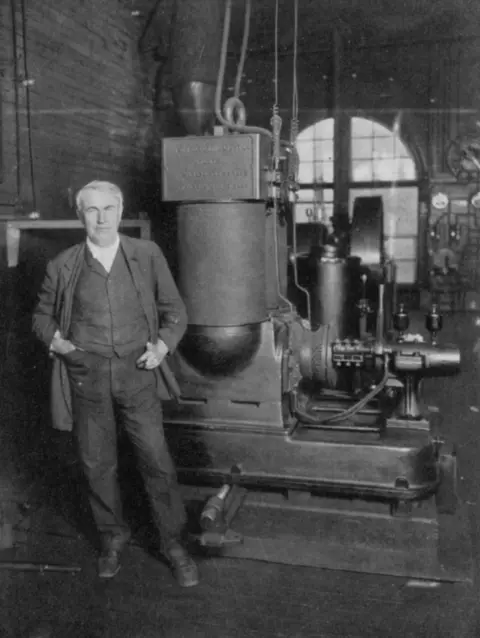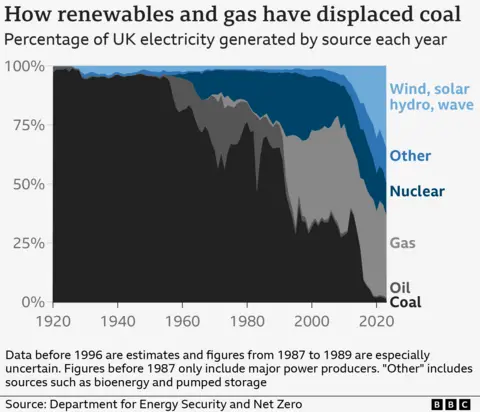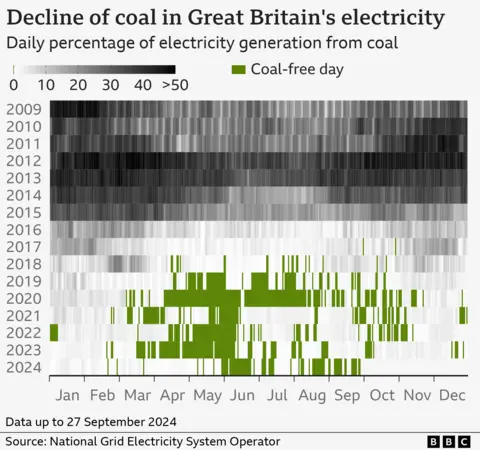Story from BBC News|Mark Poynting & Esme Stallard | The UK is about to stop producing electricity from burning coal, ending its 142-year reliance on the fossil fuel.
The country’s last coal power station, at Ratcliffe-on-Soar, finishes operations on Monday after running since 1967.
This marks a major milestone in the country’s ambitions to reduce its contribution to climate change. When burned, coal is the dirtiest fossil fuel, producing the most greenhouse gases.
Minister for Energy Michael Shanks said: “We owe generations a debt of gratitude as a country.”
The UK was the birthplace of coal power, and tomorrow, it will become the first major economy to abandon it.
“It’s a really remarkable day, because Britain, after all, built her whole strength on coal, that is the industrial revolution,” said Lord Deben – the longest serving environment secretary.
The first coal-fired power station in the world, the Holborn Viaduct power station, was built in 1882 in London by the inventor Thomas Edison – bringing light to the streets of the capital.

Oxford Science Archive/Getty Images | Thomas Edison with his dynamo – electric generator – used to produce electric light, pictured in 1882
From that point through the first half of the twentieth century, coal provided almost all of the UK’s electricity, powering homes and businesses.
In the early 1990s, coal began to be forced out of the electricity mix by gas, but coal remained a crucial component of the UK electricity grid for the next two decades.
In 2012, it still generated 39% of the UK’s power.

The growth of renewables
But the science around climate change was growing. Clearly, the world’s greenhouse gas emissions needed to be reduced, and coal, the dirtiest fossil fuel, was a major target.
In 2008, the UK established its first legally binding climate targets, and in 2015, the then-energy and climate change secretary, Amber Rudd, told the world the UK would end its use of coal power within the next decade.
Dave Jones, director of global insights at Ember, an independent energy think tank, said this helped to “set in motion” the end of coal by providing a clear direction of travel for the industry.
However, it also showed leadership and set a benchmark for other countries to follow, according to Lord Deben.
“I think it’s made a big difference because you need someone to point to and say, ‘There, they’ve done it. Why can’t we do it?'”, he said.
In 2010, renewables generated just 7% of the UK’s power. By the first half of 2024, this had grown to more than 50% – a new record.
The rapid growth of green power meant that coal could be switched off entirely for short periods, with the first coal-free days in 2017.

The growth of renewables has been so successful that the target date for ending coal power was brought forward a year, and on Monday, Ratcliffe-on-Soar, was set to close.
Chris Smith has worked at the plant for 28 years in the environment and chemistry team. She said: “It is a very momentous day. The plant has always been running and we’ve always been doing our best to keep it operating….It is a very sad moment.”
Lord Deben served in former prime minister Margaret Thatcher’s government when many of the UK’s coal mines were closed, and thousands of workers lost their jobs. He said lessons had to be learned from that for current workers in the fossil fuel industry.
“I’m particularly keen on how this Government, and indeed the previous Government, is trying to make sure that the new jobs, of which there are very many green jobs, go to the places which are being damaged by the changes.
“So in the North Sea oil areas, that’s exactly where we should be doing carbon capture and storage; it’s where we should be putting wind and solar power,” he said.
READ NEXT: Colombia Halts Fossil Fuel Exploration
Challenges ahead
Although coal is a very polluting source of energy, its benefit has been that it is available at all times—unlike wind and solar, which are limited by weather conditions.
Kayte O’Neill, the chief operating officer at the Energy System Operator – the body overseeing the UK’s electricity system – said: “There is a whole load of innovation required to help us ensure the stability of the grid. Keeping the lights on in a secure way.”
A crucial technology providing that stability Kayte O’Neill spoke of is battery technology.
Dr Sylwia Walus, research programme manager at the Faraday Institution, said that there has been significant progress in the science of batteries.
“There is always scope for a new technology, but more focus these days is really how to make it more sustainable and cheaper in production,” she said.
She explained that to achieve this, the UK needs to become more independent of China in producing its own batteries and bringing in skilled workers for this purpose.
Copyright © 2023 BBC.




